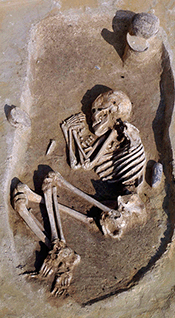
(Courtesy BDA-Neugebauer)
About 7,500 years ago, a group of farmers known as the Linearbandkeramik (LBK) culture swept across much of Europe—and in just 500 years replaced the huntergatherer cultures that had occupied the continent in one form or another since the first humans arrived. Now, a study by an international team of scientists shows that Europe's first farmers may also have introduced social inequality to the region.
The researchers measured strontium isotope ratios in the bones recovered from 300 LBK burials. By matching the ratios of strontium isotopes in bones to those in the region's soils, the researchers were able to get a clear idea of where each individual had lived.
The study showed that people who lived on the most agriculturally productive lands also tended to be buried with a ground-stone tool called an adze, which was probably used for shaping lumber and turning soil for planting. Adzes were expensive in terms of the labor needed to make them. Alexander Bentley of the University of Bristol believes that the tools indicate a slight disparity in wealth between individuals. Bentley says, "To me, this seems like the origins of inequality in something small that over the centuries was going to build up into hereditary inequality."

